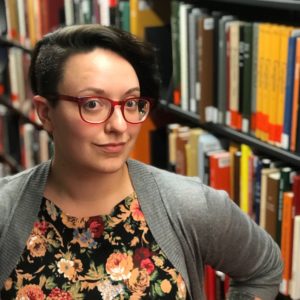 This post was written by Alex O’Keefe, who received a GLAM Cross-Pollinator Fellowship to attend this year’s DLF Forum.
This post was written by Alex O’Keefe, who received a GLAM Cross-Pollinator Fellowship to attend this year’s DLF Forum.
Alex is the Arts Digital Projects Librarian at the Robert B. Haas Family Arts Library at Yale University, and an active member of the Art Library Society of North America (ARLIS/NA). She currently serves as the 2019-2021 Co-Moderator of Art Library Students & New ARLIS Professionals (ArLiSNAP) within ARLIS/NA, and recently presented a poster about social media strategic planning at the47th Annual Conference. Her current work at the Haas Arts Library focuses on Ensemble@Yale, a crowdsourced transcription project aiming to create a database of Yale theater history from over 900 programs. This project combines data normalization, design thinking, volunteer outreach, and event planning. Her general library interests include all things data, addressing GLAM silos, gamification, outreach strategies, and collaborative projects. You can find her on Twitter: @aok_librarian.
I had my eye on attending DLF well before being chosen as a GLAM Cross-Pollinator from ARLIS/NA. I am currently the Arts Digital Projects Librarian at the Robert B. Haas Family Arts Library at Yale University, and primarily work on a crowdsourced transcription project around historical Yale theater programs called Ensemble@Yale. This project has a lot of components; many are digital, of course, but our emphasis has been fostering and serving the project’s community. My experiences with this digital project are a perfect parallel to those at DLF. I expected takeaways revolving around digital issues and left with the strong community attached to them.
Going into DLF for the first time, I anticipated revelations about the digital components of my work (data, project management, accessibility, digital preservation, etc.), matching my “of course” sentiment around Ensemble@Yale. Of course, attending this conference expanded my knowledge in these areas. Of course, sessions I attended were on workflows and processes. Of course, many conversations revolved around digital topics. What I hadn’t anticipated was the emphasis on the people around and the community behind all of those technical layers to our work.
Small practices to create an inclusive, comfortable, and person-centered environment impressed me. Using the mic, sharing slides and notes, scheduling substantial breaks, providing gender neutral bathrooms, and asking for pronouns were all noted in my observations of this inclusive approach. Moreover, many of these practices provided me the opportunity to feel like part of the #DLFvillage and comfortably join conversations like the Growing with the crowd – crowdsourcing and digital collections working session facilitated by Samantha Blickman and Ben W. Brumfield. Gathering with others who were either working on or considering crowdsourced projects transformed into discussions of the core tenant to serve our volunteers. What began as talks of logistic and data considerations quickly shifted to the people-centered nature of the work. Everyone working on an existing project emphasized this as the most important factor; making it fun, inclusive, and easy for volunteers were all points of advice from those working on projects already.
There were two presentations that were not as directly related to my work that opened up impactful discussions that were new to me. The first was Privacy matters: Incorporating surveillance pedagogy into library instruction by Andy Boyles Petersen, and the second was Ethical Digital Scholarship and Prison Labor? by Alexis Logsdon. Incorporating privacy into information literacy instruction was something I hadn’t seen explored in this way, and I had never heard of libraries using prison labor. Both shed light on how we as information professionals can strive to protect people through our practices.
Every presentation I attended tracked back to the people-centered nature of digital work. Of course, I walked away from DLF invigorated and with a list of ideas to improve my project workflows through practices I learned. I also left with the thread of people-centered work running through it all and hope to return to the village and see some of those people again soon.
